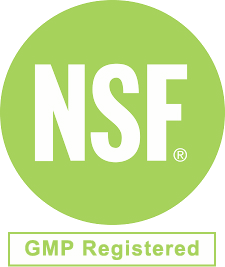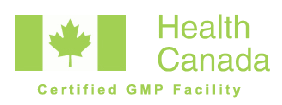
Getting Naughty with Nutraceuticals: What They Are and Why You Should Know
You're relaxing and punching through the channels on the television, food in one hand and remote in the other.
A commercial blares across the screen, advertising the usual pharmaceuticals. The next channel also has a commercial, this one about functional foods.
And the next one discusses something called "nutraceuticals."
You almost spit out your burrito.
What are nutraceuticals? What new pharmaceutical contraption has been created?
You're not alone in feeling lost between prescriptions, vitamins, dietary supplements, superfoods, and nutraceuticals; here, we'll cover the broad bases so that you won't ever have to worry about spitting out your burrito again.
And hopefully, you'll find something real to watch on the tube in the meantime.
The Basics
Before we dive into the big question (no, don't worry, we're not proposing), let's start with the basics.
Pharmaceuticals 101, we'll call it.
Pharmaceuticals are substances used to diagnose, treat or prevent illnesses and diseases. They can also modify organic functions to make all those innards work correctly.
They derive from the natural world but are altered to create the medicines we have today.
Anesthetics were among the first pharmaceuticals, with morphine, ether, and chloroform following soon after.
These drugs take many forms, from topical ointments to prescription medicines.
What Are Nutraceuticals?
This leads us to nutraceuticals, which are a bit more hazy to define.
Although many often use the term interchangeably with functional foods or dietary supplements, the three are actually distinct categories with very blurry lines.
Functional Foods
Functional foods are the not-so-yummy greens your mother always lied about. You know, the yucky ones she told you would make you big and strong?
Okay, that might be a little tongue-in-cheek. However, these particular foods can be given even more of the stuff to make you grow up and become the Hulk (if your mother is to be believed).
That orange juice that has extra calcium or the eggs for sale with enhanced omega-3 fatty acids are examples of functional food. They all are naturally consumed in diets and contain health benefits, which are sometimes boosted by added ingredients.
Those health benefits are given the nod of approval by scientists, verifying that they actually will aid you in some way.
Dietary Supplements
Sure, you get it. But let's dive deeper into the rabbit hole.
Next, we have dietary supplements, which are purposefully added to the diet to help out health-wise.
These typically are not made from the natural foods you would consume daily. In the United States, they must contain one or more of the following ingredients:
- Vitamins
- Herbs or botanicals
- Minerals
- Amino acids
- Concentrate, metabolite, extract, or constituent
In the US, these supplements cannot contain compounds approved as drugs.
So these are the fish oil capsules and probiotics you can pick up at your friendly, local health food store or pharmacy.
But now the lines converge.
What Is a Nutraceutical?
Now to the heart of the matter: a way to define nutraceuticals.
In their simplest form, a nutraceutical is "a substance, which has a physiological benefit or provides protection against chronic disease." They must be derived from food sources and obtained pharmacologically.
They are usually sold over-the-counter and provided in consumable forms that resemble a medicine, just like dietary supplements.
However, many products can be considered nutraceuticals and supplements or functional foods–or all three.
As you can imagine, the products that fall into this category can range from milk with extra vitamin D marketed for athletes to essential vitamins.
How Do They Work?
By extracting the most beneficial ingredients from food and mixing it with other health-friendly materials, your body receives a boost similar to taking a vitamin.
All the goodies enter your body, and since nutraceuticals are taken directly from healthy sources, consumers usually won't experience any side effects at all.
However, there are a plethora of types out there, so buyers must know what end goal they would like to accomplish and purchase accordingly.
Benefits
There are a number of benefits these products offer.
- Variety: There is a nutraceutical for basically every need. Whether you want healthier skin or something to boost your immune system, chances are there is a product out there precisely for your needs.
- Accessibility: These products do not require prescriptions, and they are sold throughout the entire nation in regularly-visited supercenters.
- Adverse Effects: Because they are derived from specific ingredients (depending upon location), there are rarely adverse side effects.
- Ease of Consumption: All that consumers have to do is consume (as in, purchase and eat the product). No injections or painful tests required.
Challenges
With the several advantages of nutraceuticals, there are also challenges.
Firstly, the definition of what constitutes a nutraceutical varies from culture to culture and changes with the market. This can lead to confusion over what indeed is a nutraceutical and what is not.
Secondly, scientists and researchers are still debating the worthiness of the popular products. But we'll get into that later.
Finally, every brand can be made completely different. Unlike your basic and generic medicines, which often have virtually the same ingredients, one ginseng capsule can have an entirely different makeup than the next.
That means it's harder for consumers to know which to buy. It also means it's difficult for health researchers to pinpoint how much patients should take and how often.
Further, it makes their job of assessing the outcome and promoting or discouraging use all the harder.
Do They Work?
We might have lied about that burrito because the truth is, it depends.
Research is still very much in its preliminary stages.
Some studies have had fantastic results using the products; others have shown little to no changes.
Conjugated linoleic acid, which is rumored to help users lose weight, led to a reduction of only .2 pounds per week in tests. Garlic pills, which are supposed to lower cholesterol and blood pressure, had virtually no results.
Then again, ginseng capsules showed a significant improvement in blood glucose levels for users who had type 2 diabetes.
Putting it simply, the range of effects is broad, but some have shown extreme success.
And for businesses involved in health and wellness, right now they are all the rage.
Add Nutraceuticals to Your Product List
What are nutraceuticals? For current entrepreneurs in the health industry, they are a fantastic opportunity!
Now is the perfect time to add nutraceuticals to your enterprise so that you won't have to spat out any more of those burritos. But you'll probably need help in manufacturing a quality product.
From sourcing the raw materials, to manufacturing, to labeling and to shipping, Biovation Labs is the go-to source for nutraceutical and supplement manufacturing. Contact us today to add those new products to your list.
- Posted By: Biovation Labs
- Comments: 0
- Categories: Supplements Blog
Leave a Comment Cancel reply
You must be logged in to post a comment.





